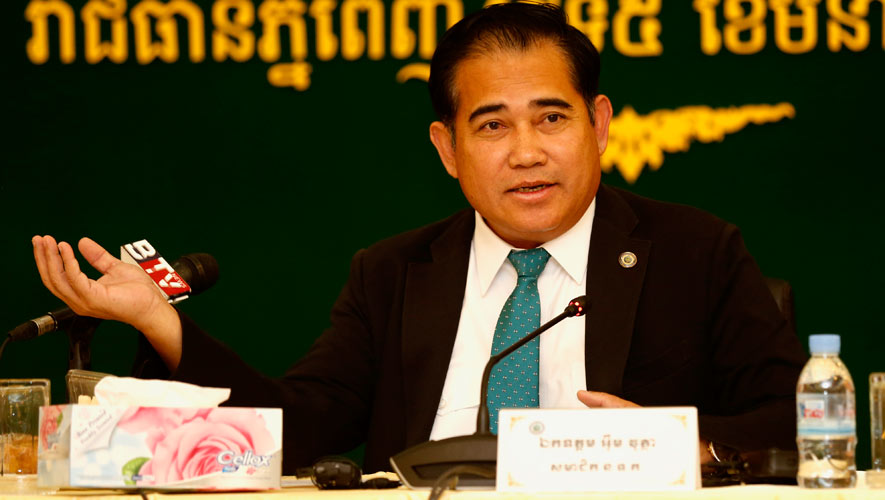The Telecommunication Regulator of Cambodia (TRC) is demanding the quality of mobile network services and the speed of the internet as well as data charges run normally although there has been an increase in domestic usage caused by people forced to work from home because of the COVID-19 outbreak.
For the latest Cambodian Business news, visit Khmer Times Business
Im Vutha, spokesman of the (TRC), says the TRC is monitoring very closely all internet service providers and telecoms operators.
“Now a lot of people are working online [from home], but they have met issues in the evening because internet traffic has risen quickly and it led to a slowing of the speed of the internet. However, we have asked the telecom to strengthen their services and quality,” said Im.
“We monitor the situation every day to make sure all the people can enjoy working from home,” Im said. “The peak hour is from 6 to 7pm. Each members in the family is surfing the internet. So far, we have yet to receive analysis data and check the results.”
The Novel Coronavirus (COVID-19) pandemic has triggered a financial shock and may cause a recession in the Kingdom. Both the public and private sectors have put much effort to sustain their operations, employment, work and cash flow during the economic downturn.
Some government organisations and other businesses have allowed their staff to work from home to protect them from the outbreak of COVID-19 in the Kingdom and to ensure operations continue.
The measures so far taken by the government have been welcomed. However, more needs to be done. Lessons learned from the Philippines, Singapore, China, South Korea, Vietnam, among other countries, have shown what works well and what needs to be done differently.
Staff are supported with phone cards which they can use for internet connections. Some of them already have internet access at home. “The internet speed is unstable but it is not a big issue for us to work from home,” said Naratevy Kek, communications coordinator of the global charity Oxfam Cambodia.
Kek added that Oxfam has a comprehensive COVID-19 staff health protocol in force across all its teams, following authorities’ advice in every country it is based.
“Currently, staff are allowed to work from home in consultation with their line manager to reduce the risk of exposure and physical contact among staff members and the surrounding environment,” she said.
“We are posting critical time-sensitive updates on our communications channels for all staff including on personal hygiene, social distancing, travel restrictions, self-isolation advice and contingency planning in the event of local transmission or lockdown which we need if we are to fully close our office,” Kek added.
Kek said her organisation set up performance objectives and weekly work plans with key deliveries which keep the work effective and results-focused.

“At home, we could continue to work while taking care of our children whose schools are closed and who have to go on online for classes. I cannot imagine how I could support my daughter with her online class and other stuff if I’m required to go to the office. We are lucky to be with an agency that understands this,” Kek added
She said Oxfam is well prepared. “All our data is already online so staff can continue their work wherever they go as long as there is an internet connection.”
An officer with the Ministry of Economy and Finance (MEF) who spoke anonymously, said it is good to work from home because it is an escape from the widespread nature of the virus at this moment.
“Working from home reduces face-to-face communication with colleague and ministry outsiders,” she said. “We do not know who has had contact with the virus and who has not.”
She added: “Although I am working online I still can go to office if I am needed or if there is an important task. Regarding to the internet connection, it is okay for me.”
MEF’s officer said she is equipped with the necessary software for internal communication and work flow. She described how the efficiency of working from home depends on the scope of work and the responsibility of each official.
“In this context, working from home is best to avoid the further outbreak of the virus,” she added. “We just need a simple laptop with an internet connection so we can easily download any software. We use Microsoft applications which are built by my internal developers. It is similar to Telegram. It’s encrypted so it is safer that other social media. Also it is easy for us to communicate although we are at home.
“It is not as comfortable as face-to-face communication or working apart at first time but we have learned to adapt to it. There are still some people working at the office but they rotate to avoid crowds.”
Thourn Sinan, chairman of B2B Cambodia (Travel/Tours/MICE/Trading) Co Ltd, said that because of the pandemic his businesses are completely dead. He added that he also allows his staff to work from home in order to protect their health, but keeps some in the office.
“Key staff who work from home are just keeping up to date all communication with clients and preparing a recovery plan after this situation ends,” Thourn added.
“Of course, we cannot compare working in an office and working from home. Working from home relies on working out of the loyalty and commitment of staff. otherwise it’s hard to control and wastes a lot of times in oversight.”
Thourn said there is much software to manage daily operations and staff who work from home so he just implements normal work procedures.
“There is no other way to sustain the business for the moment. Tourism is dead. What we can do is to maintain a plan. We have just expenses but no income.”
OPPO Cambodia has a full supply of face masks for employees and are encouraging staff to work from home but some staff members are required to be onsite. We are practising preventative measures to maximise interpersonal space, said an OPPO representative.
“OPPO has been committed to protecting our community to fight this pandemic and encourage everyone to work together to protect family, friends and neighbours alike. With the safety of our users and employees being our number one priority, we created a special team to oversee preventative actions and maintain ongoing operations,” said the OPPO Cambodia representative, who declined to be named.
“They say the internet connection at home is smooth for our staff because they are using OPPO smartphones and can share hotspots and work wirelessly on computers or laptops. We are a leading technology firm and no matter where we are, our phones work well with internet connections.
“Our HR and IT departments have worked together to develop an intranet system for our employees – through which our staff will report daily health updates. In addition, we are also reducing business travel and asking our staff to practise online communication as much as possible. We switched staff to work from home following the government and the ministry of health’s directive. We want them to stay safe.”
Tongngy Kaing, head of the communications department at the Cambodia Microfinance Association, said he is still working from his office. He added that working from home is not productive for him but he allows staff to work from home.
“Working from home saves time and creates freedom by not travelling much. Because currently the roads are not busy, I choose to travel to work at the office. My work does not involve much exposure to new people,” he added.
Kaing said: “It is depends on the work, sense of responsibility, one’s nature and commitment and working space. It depends on the environment not about commitment or lack of commitment. But, for me, I can say that working at the office is more productive.”
In Mid-March, the TRC urged all telecom operators and internet service providers to check, monitor and ensure that the quality of their services and network ability are properly connected to avoid customers being cut off.
They were told to check and install power banks and power engines to the network station because they provide an additional source of energy to ensure the reliability and efficiency of the internet services.




